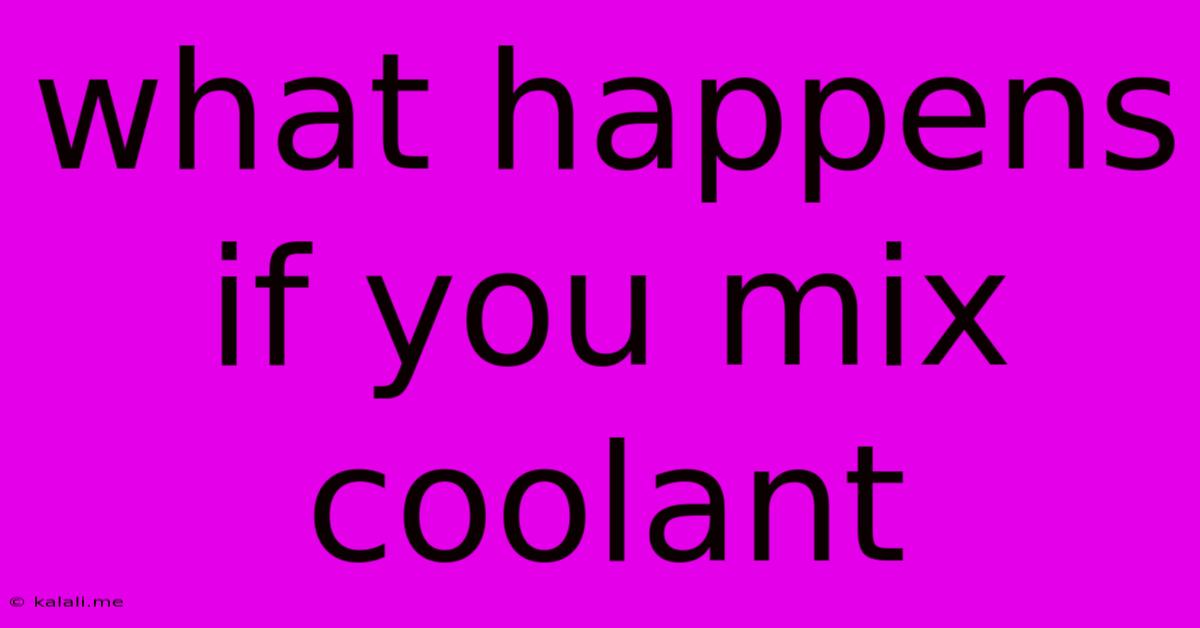What Happens If You Mix Coolant
Kalali
Jun 11, 2025 · 3 min read

Table of Contents
What Happens If You Mix Coolant? A Guide to Coolant Compatibility
Mixing coolants might seem like a simple solution when you're low on fluid, but it can lead to serious engine damage. This article explores the consequences of mixing different types of coolant and offers guidance on how to avoid costly mistakes. Understanding coolant compatibility is crucial for maintaining your vehicle's engine health and longevity.
The Dangers of Mixing Coolants
Coolants aren't all created equal. They're formulated with different chemical compositions, including varying concentrations of ethylene glycol or propylene glycol, inhibitors, and additives. Mixing incompatible coolants can result in several negative outcomes:
-
Gel Formation: This is one of the most significant risks. When incompatible coolants mix, the chemicals can react, creating a gelatinous substance that clogs the cooling system. This prevents proper coolant circulation, leading to overheating and potential engine failure.
-
Corrosion: Coolants contain corrosion inhibitors designed to protect engine components from rust and degradation. Mixing coolants can disrupt this protection, leading to accelerated corrosion of engine parts like the radiator, water pump, and engine block. This can result in costly repairs or even engine replacement.
-
Reduced Coolant Effectiveness: The combined mixture might lose its effectiveness in preventing overheating. This is because the different inhibitors and additives may counteract each other, reducing their overall protective properties.
-
Cavitation: This phenomenon occurs when the coolant mixture creates air bubbles within the cooling system. These bubbles can cause damage to the water pump and other components by eroding their surfaces.
Types of Coolant and Their Compatibility
Understanding the different types of coolant is crucial in avoiding mixing problems. Generally, coolants are categorized into two main types:
-
IAT (Inorganic Additive Technology): These older coolants typically have a shorter lifespan and are often green or yellow in color. Do not mix IAT coolants with OAT or HOAT coolants.
-
OAT (Organic Acid Technology): These coolants generally last longer and often are orange or red in color. Mixing OAT coolants with IAT or HOAT coolants is generally not recommended.
-
HOAT (Hybrid Organic Acid Technology): These coolants combine aspects of both IAT and OAT coolants, offering a balance between longevity and cost-effectiveness. They often appear orange or red. Mixing HOAT with IAT is not recommended.
What to Do If You Accidentally Mixed Coolant
If you've accidentally mixed incompatible coolants, the best course of action is to flush the entire cooling system. This involves completely draining the existing coolant and thoroughly rinsing the system with clean water to remove all traces of the mixed fluids. After flushing, refill the system with the correct type of coolant according to your vehicle's manufacturer specifications.
Preventing Coolant Mixing Issues
-
Check your owner's manual: This crucial document will specify the recommended type of coolant for your vehicle.
-
Use the correct coolant: Always use the coolant type specified by your vehicle's manufacturer.
-
Avoid topping off with different coolant: If you need to add coolant, use the same type that's already in the system.
-
Regular coolant flushes: Regularly flushing and replacing your coolant according to the manufacturer's recommendations will prevent the buildup of contaminants and ensure optimal engine performance.
Conclusion:
Mixing coolants can have significant negative consequences for your vehicle's engine. By understanding the different types of coolants and their compatibility, and by following the recommendations outlined in this guide, you can avoid costly repairs and maintain the health of your engine for years to come. Remember, prevention is always better than cure when it comes to your vehicle's cooling system.
Latest Posts
Latest Posts
-
Asking For A Promotion Letter Template
Jun 12, 2025
-
How Many Seconds In 5 Days
Jun 12, 2025
-
What Is 12 Percent Of 48
Jun 12, 2025
-
Who Wrote The Book Bhagavad Gita
Jun 12, 2025
-
How To Spell The Word 20
Jun 12, 2025
Related Post
Thank you for visiting our website which covers about What Happens If You Mix Coolant . We hope the information provided has been useful to you. Feel free to contact us if you have any questions or need further assistance. See you next time and don't miss to bookmark.